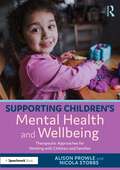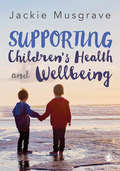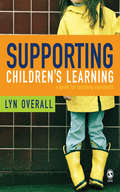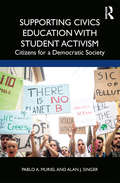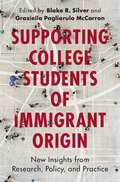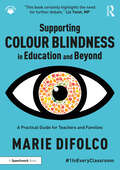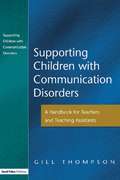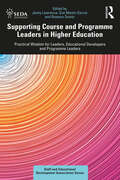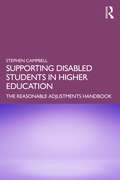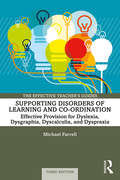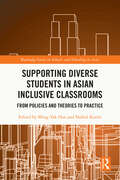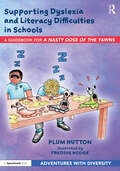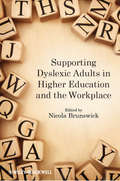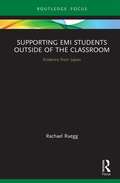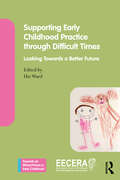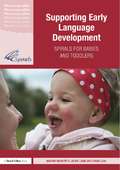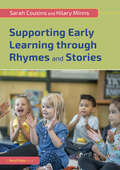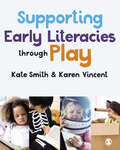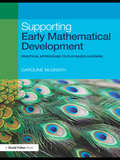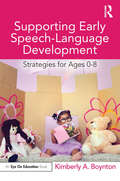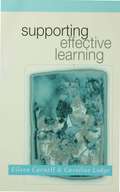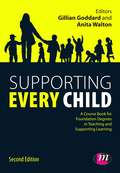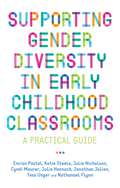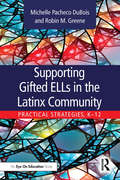- Table View
- List View
Supporting Children’s Mental Health and Wellbeing: Therapeutic Approaches for Working with Children and Families
by Nicola Stobbs Alison ProwleThis key text recognises the importance of upskilling students and practitioners to understand children’s holistic needs and to develop new ways of working therapeutically that support their wellbeing and resilience.The book outlines why therapeutic approaches are necessary, considers the range of approaches that are available and the evidence behind them and shows how these can be used to support children and families in an increasingly challenging practice landscape. Placing an emphasis on self-care, it celebrates the role of the practitioner as an inspirer of hope and architect of resilience and self-efficacy. Each chapter in the book: Provides an overview of adversity, trauma and holistic wellbeing Includes helpful case studies and practical examples, alongside reflective questions that can be used as discussion points in seminars Takes a multi-disciplinary approach with contributions from specialists working directly with children and families across a range of settings Equips students and practitioners with a wide range of models, tools and approaches to achieve their best outcomes Offers advice for developing a therapeutic relationship, and the skills and dispositions needed for practice. This informative and practical book will be essential reading for students in a range of disciplines, including early years professional practice and early childhood degrees, as well as education, health, social care and community services. It will also be a valuable resource for early years and primary practitioners, trauma-informed schools and organisations supporting children and families.
Supporting Children′s Health and Wellbeing
by Jackie MusgraveIn the recent years ′safeguarding′ measures to ensure the health and wellbeing of all children has become an increasing focus in the early years. Supporting Children′s Health and Wellbeing helps early years students and practitioners working with children and young people gain an understanding of the key issues relating to children’s health in particular, examining the possible ways in which health can impact upon young children’s early childhood education and care. Packed full of practical advice for the everyday realities of the early years classroom, topics discussed include: Historical perspectives and contemporary issues related to child health Current policy and legislation How to support the child and the family Nutrition in childhood Infectious diseases, infestations and the acutely ill child Children with chronic and complex medical conditions Coping with the death of a child A timely, topical text that will be invaluable to early years professionals. Jackie Musgrave will be discussing key ideas from Supporting Children’s Health and Wellbeing in the SAGE Early Years Masterclass, a free professional development experience hosted by Kathy Brodie.
Supporting Children′s Learning: A Guide for Teaching Assistants
by Lyn OverallAre you looking for a book that explains all the key ideas on how children learn, and how to best support children in that learning? Covering all the major themes, this book offers: o An introduction to the main theories of learning and development, from birth to primary; o A chapter on brain development; o An introduction to what motivates learners to learn, and how much learners understand about how learning takes place; o A glossary of key terms; o Case studies, research summaries, tasks for reflection, chapter summaries and advice on further reading. This book will be essential reading for Teaching Assistants studying for Foundation Degrees, or for the Higher Level Teaching Assistant qualification. Students on any course looking at how children learn (such as Early Childhood and teacher training courses) will likewise find this book covers all the key themes. Lyn Overall is Principal Lecturer at Sheffield Hallam University.
Supporting Civics Education with Student Activism: Citizens for a Democratic Society
by Alan J. Singer Pablo A. MurielThis book empowers teachers to support student activists. The authors examine arguments for promoting student activism, explore state and national curriculum standards, suggest activist projects, and report examples of student individual and group activism. By offering suggestions for engaging students as activists across the K-12 curriculum and by including the stories of student activists who became lifetime activists, the book demonstrates how activism can serve to bolster democracy and be a component of rich, experiential learning. Including interviews with student and teacher activists, this volume highlights issues such as racial and immigrant justice, anti-gun violence, and climate change.
Supporting College Students of Immigrant Origin: New Insights from Research, Policy, and Practice
by Blake R. Silver Graziella Pagliarulo MccarronOver 5 million college students in the United States – nearly one-in-three students currently enrolled – are of immigrant origin, meaning they are either the children of immigrant parents or guardians and/or immigrants themselves. These students accounted for almost 60% of the growth in higher education enrolment in the 21st century. Nevertheless, there is very little research dedicated to this student population's specific experiences of postsecondary education, with similar absences discernible within the realms of higher education policy and practice. Although college campuses are making important progress in building more inclusive spaces, conversations about climate and student care rarely account for the journeys of students of immigrant origin. Featuring 20 chapters written by more than 50 contributors, this book addresses this glaring omission. The authors examine how students of immigrant origin experience the road to, through, and beyond higher education, while, simultaneously, speaking to evidence-based implications for policy, research, and practice.
Supporting Colour Blindness in Education and Beyond: A Practical Guide for Teachers and Families
by Marie DifolcoWould you be surprised to know, one child in every average class of thirty is Colour Blind?Colour Blindness can be a barrier to learning across the whole curriculum, yet most schools cannot identify all their Colour Blind children, and practitioners often cannot recall teaching a child with it.This essential guide explores Colour Blindness, an often-unrecognised special educational need and disability (SEND). It gives you the tools and confidence to ensure children with Colour Blindness can reach their full potential. It helps you to understand what the condition is so you can easily make your teaching accessible and inclusive to all Colour Blind children, undiagnosed or not. The book:• Offers detailed and practical guidance for identifying Colour Blindness and catering for it from early years through to higher education and beyond.• Focuses on simple and easy-to-implement strategies to ensure Colour Blind children are not disadvantaged, dispelling myths and misguidance along the way.• Discusses how educators and parents can work together to raise the child’s self-esteem, seeking solutions and interventions that do not single them out, or in fact remove colour as a useful tool for those that see it normally.This accessible book is vital reading for SENDCos, teachers and classroom assistants, from nursery through to upper secondary, as well as the parents and carers of Colour Blind children.
Supporting Communication Disorders: A Handbook for Teachers and Teaching Assistants
by Gill ThompsonThis practical handbook provides SENCOs, class teachers and teaching assistants with a step-by-step guide to the identification of speech and language disorders, a basic knowledge of the underlying causes and guidance for developing strategies for support and intervention in the classroom. It gives a foundation for assessment and differentiation, which will help the teacher or teaching assistant to work effectively in collaboration with speech and language therapists. It suggests appropriate materials and programmes of work for enabling the child to access the curriculum as fully as possible. The book includes photocopiable assessments and worksheets, which can be used as part of planning and intervention for individual children or small group work.
Supporting Course and Programme Leaders in Higher Education: Practical Wisdom for Leaders, Educational Developers and Programme Leaders (SEDA Series)
by Jenny LawrenceOffering research- and evidence-based approaches that explore the essential components of programme leadership in higher education, this book is designed to define, develop and support the programme leadership role and all those who undertake it. The book is split into three parts, taking into account the three different lenses through which programme leaders and their professional practice and relationships are generally viewed: the institution, the individual and the programme team. Chapters and case studies address key elements crucial to the holistic development of programme leadership and programme leaders. These include: Understanding and developing programme leadership in context Developing organisational structures and processes so programme leaders can thrive Growing programme leaders’ educational leadership, team working and communication Crucial reading for programme leaders, as well as academic and educational developers and leaders working across faculties and whole institutions, this text includes contributions from teaching- and research-focused higher education institutions, as well as established and modern college- and university-based providers in both the northern and southern hemispheres.
Supporting Disabled Students in Higher Education: The Reasonable Adjustments Handbook
by Stephen CampbellSupporting Disabled Students in Higher Education is a practical and inclusive handbook designed to ensure disabled students are supported in their journey through mainstream higher education. Informed by case studies, this essential guide highlights how this can be achieved through the adoption of practical, reasonable adjustments. Coupled with recommendations for best practice across higher education, this book outlines experiences and barriers to inclusion and provides detailed guidance for inclusive practices including adjustments to accommodation, accessing physical and virtual learning spaces, teaching activities, developing the curriculum and assessment. Written by an experienced dyslexia and disability coordinator within higher education, chapters encourage readers to develop a greater understanding of the impact that disabilities may have on students’ academic progress. Areas explored include: Specific learning difficulties (SpLD) Mental health conditions Visually impaired and blind students Deaf and hearing-impaired students Physical impairments Long-term medical conditions This book lays out the step-by-step process to enable effective communication between disability staff, academic staff and students and is a crucial guide for anyone with an interest in promoting and facilitating accessibility, inclusion and widening participation in higher education.
Supporting Disorders of Learning and Co-ordination: Effective Provision for Dyslexia, Dysgraphia, Dyscalculia, and Dyspraxia (The Effective Teacher's Guides)
by Michael FarrellThis revised and updated third edition, previously titled The Effective Teacher's Guide to Dyslexia and Other Learning Difficulties (Learning Disabilities), unravels the complexity of specific learning difficulties in an accessible and user-friendly way. Each chapter provides key information about the disorder in question, giving a clear definition before discussing prevalence, causal factors, identification, and assessment and provision. Implications for the curriculum and related assessment, pedagogy, resources, therapy/care, and school and classroom organisation are explained, allowing providers to reflect and adapt their practice in response to the needs of the individual. The book informs effective provision, with the aim of encouraging the best achievement and personal and social development for children and young people. The book authoritatively and lucidly addresses issues associated with • impairment in reading/dyslexia, • impairment in written expression/dysgraphia, • impairment in mathematics/dyscalculia, and • developmental co-ordination disorder/dyspraxia. Recognising the importance and the challenge of multi-professional working, the book relates provision to the roles of parents and carers alongside that of the practitioner. Underpinned by research and widely held professional judgement, this will prove a practical, readable, and inspiring resource for professionals in the UK, US, and elsewhere including teachers, therapists, psychologists, and students entering these professions.
Supporting Diverse Students in Asian Inclusive Classrooms: From Policies and Theories to Practice (Routledge Series on Schools and Schooling in Asia)
by Ming-Tak HueThis edited book is uniquely set in the context of Chinese societies. It deals with the issues of inclusive education in a Chinese context and examines inclusion from the experience of Hong Kong schools. Like other countries, in Hong Kong, inclusive education has been promoted through integrated education (IE) and the Whole-School Approach (WSA). Recently, the government has introduced the induction of Special Educational Needs Coordinator (SENCo) in each Hong Kong school to help diverse students, especially students with special educational needs (SEN) and to develop inclusive teaching and learning practices. This book is one of the first to examine the influence of contextual and Chinese cultural factors in the field of inclusive education, in regards to how schools support students with diverse learning needs and SEN. It also offers an account of context-specific measures towards promoting inclusive education. This book will help scholars and school practitioners in Asia in particular and in the West, in general, develop a comprehensive understanding of context-specific inclusive practices in education for students with diverse learning needs.
Supporting Dyslexia and Literacy Difficulties in Schools: A Guidebook for ‘A Nasty Dose of the Yawns’ (Adventures with Diversity)
by Plum HuttonThis guidebook, designed to be used alongside the storybook A Nasty Dose of the Yawns, has been created to educate readers on the practical, social and psychological impacts of dyslexia on children and young people. Providing an easy-to-read introduction to dyslexia and literacy difficulties, this resource is rooted in theory and takes a holistic approach to supporting children with dyslexia. Chapters cover not only strategies to support literacy before and during their school lives, but also offer an understanding of the emotional challenges that come with struggling to master a skill that other people pick up so easily. Key features include: an accessible guide to dyslexia and literacy difficulties chapter-by-chapter discussion points for use with A Nasty Dose of the Yawns, supporting young people’s reading of the story, helping them to understand dyslexia and encouraging them to recognise their strengths case studies and strategies to help parents and practitioners recognise the challenges faced by children with dyslexia, and to provide additional support. This is an essential resource for parents, teachers and other professionals supporting children aged 8–12 with literacy difficulties or dyslexia.
Supporting Dyslexic Adults in Higher Education and the Workplace
by Nicola BrunswickSupporting Dyslexic Adults provides practical advice in supporting dyslexic adults in education and employment, and guidance on the latest researchProvides an important overview of current research and practice in supporting dyslexic adults in education and employment, deftly combining academic understanding with everyday issuesContributors possess a wealth of practical experience in the field which provides an indispensible guide to the subjectCase studies are included to capture the immediate experiences of dyslexic adults in education and at work to highlight prevalent issuesOffers practical advice to adults with dyslexia, from how to disclose their particular needs to employers and colleagues to legal aspects of dyslexia supportHighlights to employers the particular skills and strengths that dyslexic adults can bring to the workplace
Supporting EMI Students Outside of the Classroom: Evidence from Japan (Routledge Focus on English-Medium Instruction in Higher Education)
by Rachael RueggThere is a growing body of research on English-medium Instruction (EMI) in Asian contexts, and much of this research points out difficulties experienced by stakeholders. This volume takes up the issue of support for EMI, which is, and which can be, offered to students outside of the classroom in order to help them succeed academically in an EMI environment. Dr Ruegg’s book demonstrates the effectiveness of such support in the Japanese context. It begins by examining the support currently available for students in English-medium full degree programmes then goes on to examine one successful support service in more detail in order to determine the kinds of effects that can be achieved by establishing such a centre. The research reported in this book was conducted in Japan, but the findings will apply in other locations, especially in other Asian countries. The information provided in the book is expected to inform institutions who are looking to either establish an English-medium degree programme or improve on an existing programme by sharing information about the practices of other institutions.
Supporting Early Childhood Practice Through Difficult Times: Looking Towards a Better Future (Towards an Ethical Praxis in Early Childhood)
by Ute WardSupporting Early Childhood Practice Through Difficult Times encourages early childhood students and practitioners to take stock of current practices and pedagogies in light of challenges like the COVID-19 pandemic, ecological concerns, and regulatory pressures.The contributions from various scholars and practitioners present a range of theoretical concepts as well as innovative practice examples, inviting deep reflection on your own beliefs and attitudes. They examine and envisage different ways of working with and for young children, their families and communities for a better future. Chapters in this timely book include experts from around the globe examining key issues in early childhood education. The first section questions the increasing digitalisation in nurseries and pre-schools and its impact on staff members, parents and children. The second section focuses on workforce development, management systems and the role of parents in policymaking. The third section showcases innovative pedagogical approaches looking beyond widely accepted early learning goals, assessments and curricula to develop inclusive environments that foster all children’s development and learning. Lastly, the fourth section steps back from day-to-day practice and considers what concern for the environment, social justice and posthumanism means for early childhood education and pedagogy. This book will be a key resource for early childhood education and care practitioners, graduate students, policymakers and researchers facilitating the step from the here-and-now to revised future practice and policy that will enable all children to flourish.
Supporting Early Language Development: Spirals for babies and toddlers
by Marion Nash Jackie Lowe David LeahEarly years practitioners, parents and carers, child minders, health visitors do you need effective ideas for giving your babies and toddlers support to become confident talkers? National research shows that poor language and communication skills have a profound effect on the life chances of children and young people. This highly practical book will enable you to give children in your care the help they need to build their crucial language skills at the earliest point in their development. Based on the author’s highly regarded SPIRALS language development programme, the book provides over 40 tried and tested sessions to help develop children’s early speech, language and communication. Each language concept is introduced one at a time and builds on the most frequently used words by infants. It suggests ways to use music, repetition, simple meaningful gestures and signing to reinforce children’s understanding. Features include: Clear guidelines for introducing specific games and activities at the right developmental level for babies and toddlers to develop their language skills from 0 to 3 ½ years Ideas for progression based on child development Insights into the underlying psychology of the activities we suggest Advice on when to begin to use small group activities Guidance on what to do if a child is reluctant to join in. Practical suggestions for involving parents as partners Photocopiable recording sheets Suggestions for further reading and resources. Written by a leading authority in the field, this exciting new resource provides everything you need to support young children's language skills at the earliest point in their development.
Supporting Early Learning through Rhymes and Stories
by Hilary Minns Sarah CousinsThis book shows how adults can bring rhymes and stories to life with young children and support children’s early steps in communication and literacy. Focusing on the use of rhythm, rhyme and repetition in nursery rhymes and traditional tales from around the world, it provides a wealth of practical ideas for using rhymes and stories one-on-one, in small groups or with whole classes. Drawing from the culmination of their many years of combined experience, the two authors link the theoretical understanding of language and communication with the practical use of rhymes and oral storytelling in the classroom, nursery and at home. Early chapters (or Part I) provide a rationale for using rhyme, rhythm and repetition to inspire children to play with words and develop a love of language, building a foundation for literacy learning. Part II consists of ten lively chapters featuring original and re-imagined traditional fairy tales, containing: Accompanying rhymes to use with children Key themes including friendship, kindness, compassion and generosity Follow-up activities activities for extending children’s vocabulary, building their confidence and developing critical thinking Suggestions of using voices, facial expressions, gestures, props and puppets to enrich children’s emotional, imaginative and intellectual experience This delightful and practical book will be valuable reading for all adults wanting to support young children’s creative learning through enjoyable and valuable experiences.
Supporting Early Literacies through Play
by Kate Smith Karen VincentBringing together two key areas within early childhood— play and literacy — this book offers an innovative approach to examining literacies within the context of children’s play. This book: Introduces students to contemporary theory and research in the field Explores the debates surrounding young children’s play and how language and literacies are created through a range of play activity Helps students to reflect on how this knowledge can be applied in their future professional lives working to support young children Advocating for young children’s play and diverse literacies, this book supports students to develop a depth of knowledge about how play can extend children’s literacies, and encourages early childhood educators to reflect on and enhance their literacy practices with young children.
Supporting Early Literacies through Play
by Kate Smith Karen VincentBringing together two key areas within early childhood— play and literacy — this book offers an innovative approach to examining literacies within the context of children’s play. This book: Introduces students to contemporary theory and research in the field Explores the debates surrounding young children’s play and how language and literacies are created through a range of play activity Helps students to reflect on how this knowledge can be applied in their future professional lives working to support young children Advocating for young children’s play and diverse literacies, this book supports students to develop a depth of knowledge about how play can extend children’s literacies, and encourages early childhood educators to reflect on and enhance their literacy practices with young children.
Supporting Early Mathematical Development: Practical Approaches to Play-Based Learning
by Caroline McGrathSupporting Early Mathematical Development is an essential text for current Early Years practitioners and students, offering an excellent blend of theory and practice that will enable you to provide successful mathematical education for children from birth to eight years old. Charting the delivery of mathematical development in Playgroups, Children's Centres, Nurseries and Primary Schools, it forges links between current practice and fundamental Early Years principles and makes suggestions for creating effective pedagogies in maths teaching. Promoting mathematical development through play-based learning, this book presents: a wealth of practical multi-sensory teaching strategies instructional methodologies activity ideas incorporating play, books, songs, cookery and the outdoors examples of children's work advice on translating theory into practice questions for reflective practice. Throughout the book, Caroline McGrath breaks down the complexity of teaching and learning mathematics into simple steps and guides readers through possible gaps in their knowledge, bringing fresh enthusiasm to teaching mathematics. This is an invaluable resource for practitioners and trainee teachers wishing to strengthen their mathematical teaching and professional practice, or for students on a wide range of Early Years courses.
Supporting Early Speech-Language Development: Strategies for Ages 0-8
by Kimberly A BoyntonLearn how to support developmentally rich language learning environments during a child’s first eight years of life! This book demonstrates how to build foundations for a strong communication system, distinguish typical and disordered speech and language, and develop a deep understanding of the brain and language development connection. Featuring clear guidance on how to work with parents and speech-language pathologists, educators will find easy to implement strategies for supporting healthy communication and navigating any stumbling blocks in the early childhood classroom.
Supporting Effective Learning: Resources For Supporting Effective Learning
by Caroline M Lodge Dr Eileen Carnell`Teachers will find this book helpful because it locates convincing theoretical reasoning with the familiar practice of the learning environments of the secondary school. Many other learners, in formal education and beyond, might simply find the book an informative and challenging read.... The book provides more than a theoretical and ideological extension of a social constructivist of model learning. It identifies a realistic way forward. Perhaps it will have the impact it deserves' - British Journal Educational Psychology `Eileen Carnell and Caroline Lodge have given us a book with many virtues.... It is thoughtful and thought-provoking, and the many examples and case studies bring the theoretical discussions alive' - Ron Best, Cambridge Journal of Education `The overall style of the book is highly reader-friendly. The links between ideas are clear, the case studies are by and large helpful, and the bullet pointed practical strategies are substantial enough to give practitioners throughout the key stages new ideas to try. This is an intelligently written book which does much to further the effective learning debate' - Angela Scott, British Journal of Special Education 'This book is highly useful for teacher trainees (pre-service and in-service). School administrators will find it useful to develop a system that will help change focus from teaching to learning. Above all, anyone interested in student learning will find the volume extremely useful' - Sanjaya Mishra, British Journal of Educational Technology This teacher-friendly book focuses on learning at all levels in secondary schools. The authors are mainly concerned with how young people learn and how those in different roles in schools can promote their learning. They combine research with challenging ideas to stimulate tutors, subject teachers, team leaders and school managers as well as mentors and governors to think about their role in young people's learning. They examine these relationships within school and beyond its boundaries. The authors do this by drawing on different voices in secondary schools: young people, as well as parents, teachers and others who have a role in supporting young people's learning. This book will be essential reading for PGCE Secondary Students and practising teachers of the 11-16 age-range; local authority advisers and secondary school managers. Eileen Carnell has been involved for 25 years in teaching, professional development and educational research and is at present Senior Lecturer in Education at the Institute of Education, University of London. Caroline Lodge is Senior Lecturer in Effectiveness and Improvement, Associate Director of International School Effectiveness and Improvement Centre at the Institute of Education.
Supporting Every Child: A Course Book For Foundation Degrees In Teaching And Supporting Learning (Working with Children, Young People and Families LM Series)
by Anita Walton Gillian GoddardThis course book is for all degree students who are support staff, particularly teaching assistants (TAs), working in educational settings. It focuses on professional, academic and vocational issues that are common to support workers across the school sectors, and provides essential guidance on the increasingly complex role of all those involved in teaching and supporting learning. The reader is supported throughout by learning objectives, practical and reflective tasks, relevant case studies and chapter summaries. This new edition has been extensively revised to reflect recent changes in legislation, policy and the curriculum. It includes new or significantly amended chapters; on the development of support staff; supporting pupils in crisis; learning in the early years; inclusion, SEN and phonics. New to this edition: New legislation and policy changes mean updates required. Development of a new curriculum has brought changes.
Supporting Gender Diversity in Early Childhood Classrooms: A Practical Guide
by Julie Nicholson Julia Hennock Jonathan Julian Cyndi Maurer Nathanael Flynn Encian Pastel Katie Steele Tess UngerBy offering practical steps for adults who work with young children to build inclusive and intentional spaces where all children receive positive messages about their unique gender selves, this book increases awareness about gender diversity in learning environments such as child care centres, family child care homes and preschools.The book is based on some of the most progressive, modern understandings of gender and intersectionality, as well as research on child development, gender health, trauma informed practices and the science of adult learning. By including the voices and lived experiences of gender-expansive children, transgender adults, early childhood educators and parents and family members of trans and gender-expansive children, it contextualizes what it means to rethink early learning programs with a commitment to gender justice and gender equality for all children.
Supporting Gifted ELLs in the Latinx Community: Practical Strategies, K-12
by Michelle Pacheco DuBois Robin M. GreeneThis essential resource is designed to help your classroom, school, or district better identify and serve gifted English language learners in the Latinx community. Drawing on detailed case studies and vignettes from actual programs, chapters highlight the unique needs of gifted Latinx English language learners, and look at how you can best identify and support their development. Covering topics from teacher bias and systemic racism to best practices for engaging families and communities, this book lays out practical strategies and an accessible framework for implementing culturally responsive assessments, identification, and programming strategies.
